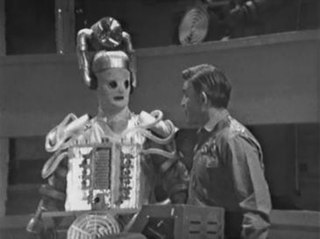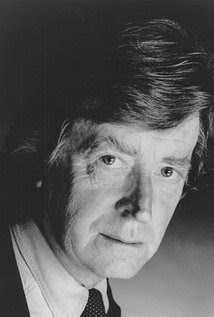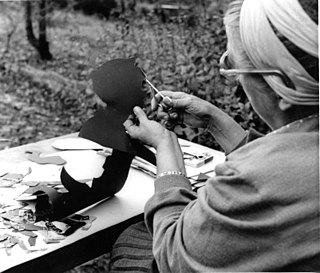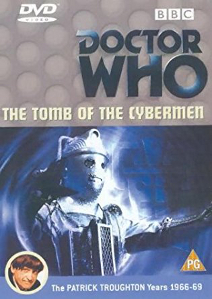Related Research Articles

Thomas Stewart Baker is an English actor and writer. He is best known for having played the fourth incarnation and longest-serving Doctor in the science fiction television series Doctor Who from 1974 to 1981.

Saiyūki,, is a Japanese television drama based on the 16th-century Chinese novel Journey to the West by Wu Cheng'en. Filmed in Northwest China and Inner Mongolia, the show was produced by Nippon TV and International Television Films and broadcast from 1978 to 1980 on Nippon TV.
Remembrance of the Daleks is the first serial of the 25th season of the British science fiction television series Doctor Who. The serial was first broadcast in four weekly episodes from 5 to 26 October 1988. It was written by Ben Aaronovitch and directed by Andrew Morgan.

The Tenth Planet is the partly missing second serial of the fourth season in the British science fiction television series Doctor Who, which was first broadcast in four weekly parts from 8 to 29 October 1966. It was William Hartnell's last regular appearance as the First Doctor, and the first story to feature the process later termed "regeneration", whereby the lead character, The Doctor, undergoes a transformation into a new physical form. Patrick Troughton makes his first, uncredited appearance as the Second Doctor.

David Collings was an English actor. In an extensive career he appeared in many roles on stage, television, film and radio, as well as various audio books, voiceovers, concert readings and other work. He garnered a following through his numerous appearances in cult sci-fi series such as Doctor Who, Sapphire & Steel and Blake's 7, as well as dubbing the titular character in the series Monkey and Legolas in the classic BBC Radio 4 adaptation of Tolkien's The Lord of the Rings.
The Moonbase is the half-missing sixth serial of the fourth season in the British science fiction television series Doctor Who, which was first broadcast on BBC1 in four weekly parts from 11 February to 4 March 1967.
The Invasion is the partly missing third serial of the sixth season of the British science fiction television series Doctor Who, which was first broadcast in eight weekly parts from 2 November to 21 December 1968.

Lupin III: The Mystery of Mamo, also known as Lupin III: The Secret of Mamo, is a 1978 Japanese animated science fiction action adventure comedy film. It is the first animated feature film based on the 1967–69 manga series Lupin III by Monkey Punch. The film was originally released in Japan as Lupin III, but was later retitled to Lupin III: Lupin vs. the Clone. Directed by Sōji Yoshikawa, who co-wrote the screenplay with Atsushi Yamatoya, the film was produced by animation studio Tokyo Movie Shinsha and distributed by Toho. The film's plot follows master thief Lupin III, who attempts to foil Mamo ― a wealthy and powerful recluse seeking immortality ― while trying to win the affections of his rival and would-be lover, Fujiko Mine.
Michael Kilgarriff is a British actor, author and pianist from Brighton. As an actor, he is well known for his rich voice and height. His film and television roles include The Dark Crystal (1982) as the General, and the Doctor Who serials The Tomb of the Cybermen (1967), Robot (1974–75) and Attack of the Cybermen (1985).
"Rise of the Cybermen" is the fifth episode of the second series of the British science fiction television programme Doctor Who, which was first broadcast on BBC One on 13 May 2006. The episode introduces a terrestrial reinvention of the Cybermen, as well as a parallel universe which would serve as a recurring plot element in the series. It is the first part of a two-part story, the concluding part being "The Age of Steel", broadcast on 20 May.

Silhouette animation is animation in which the characters are only visible as black silhouettes. This is usually accomplished by backlighting articulated cardboard cut-outs, though other methods exist. It is partially inspired by, but for a number of reasons technically distinct from, shadow play.

Lapitch the Little Shoemaker is a 1997 animated feature that was originally released by Croatia Film. Produced on vintage cel equipment during the early 1990s, this was the third feature from Croatia Film's animation unit and director Milan Blažeković, after The Elm-Chanted Forest (1986) and The Magician's Hat (1990).

Michel Ocelot is a French writer, designer, storyboard artist and director of animated films and television programs and a former president of the International Animated Film Association. Though best known for his 1998 debut feature Kirikou and the Sorceress, his earlier films and television work had already won Césars and British Academy Film Awards among others and he was made a chevalier of the Légion d'honneur on 23 October 2009, presented to him by Agnès Varda who had been promoted to commandeur earlier the same year. In 2015 he got the Lifetime Achievement Award at the World Festival of Animated Film - Animafest Zagreb.

Azur & Asmar: The Princes' Quest is a 2006 animated fairytale fantasy film written and directed by Michel Ocelot and animated at the Paris animation and visual effects studio Mac Guff Ligne. It was released in theaters in North America as just Azur & Asmar.
Lapitch the Little Shoemaker is a Croatian animated television series from Croatia Film and EM.TV/HaffaDiebold, with animation by Neptuno Films of Barcelona, Spain. It is a spin-off from the 1997 film of the same name.
Dragons et Princesses is a 2010 French computer animation television program written, storyboarded and directed by Michel Ocelot and produced at Studio O for Canal+. It is a fairy tale anthology series of ten further 13-minute episodes in the format established in Ciné si, though made in computer animation rendered in a silhouette instead of traditional silhouette animation made with backlit cut-outs. Five of the episodes are edited, with a feature-exclusive sixth, into the 2011 stereoscopic compilation movie Tales of the Night.

The twenty-fifth season of British science fiction television series Doctor Who began on 5 October 1988. It comprised four separate serials, beginning with Remembrance of the Daleks and ending with The Greatest Show in the Galaxy. To mark the 25th anniversary season, producer John Nathan-Turner brought back the Daleks and the Cybermen. The American New Jersey Network also made a special behind-the-scenes documentary called The Making of Doctor Who, which followed the production of the 25th anniversary story Silver Nemesis. Andrew Cartmel script edited the series.

The fifth season of British science fiction television series Doctor Who began on 2 September 1967 with the first story of season 5 The Tomb of the Cybermen and ended on 1 June 1968 with The Wheel in Space. Only 22 out of 40 episodes are held in the BBC archives; 18 remain missing. As a result, only 2 serials exist entirely. However, The Abominable Snowmen, The Ice Warriors, The Web of Fear, and Fury from the Deep have had their missing episodes reconstructed using animation.

Dilili in Paris is a 2018 animated period adventure film written and directed by Michel Ocelot, with pre-production by Studio O and animation production by Mac Guff, about a Kanak girl investigating a mystery in Paris in the Belle Époque. It stars the voices of Prunelle Charles-Ambron, Enzo Ratsito, and Natalie Dessay as Emma Calvé in the original, French-language version.
"The Timeless Children" is the tenth and final episode of the twelfth series of the British science fiction television programme Doctor Who, first broadcast on BBC One on 1 March 2020. It was written by Chris Chibnall, and directed by Jamie Magnus Stone. It is the second of a two-part story; the previous episode, "Ascension of the Cybermen", aired on 23 February.
References
- ↑ Stephens, Francis (1958). Theatre World Annual. Vol. 9. London: Rockcliff Publishing Corporation. p. 31.
- ↑ Christie, Agatha (1958). Verdict (script). London: Samuel French Ltd. p. 4. ISBN 0-573-61931-X.
- ↑ Blum, Daniel (1992). Screen World 1959. Vol. 1. Biblo & Tannen Booksellers & Publishers, Inc. p. 184. ISBN 0-8196-0265-5.
- ↑ Young, R.G. (2000). The Encyclopedia of Fantastic Film: Ali Baba to Zombies. Berkeley, California: Applause Books. p. 59. ISBN 1-55783-269-2.
- ↑ American Film Institute (1997). The American Film Institute Catalog of Motion Pictures Produced in the United States: Feature Films (1 ed.). Berkeley, California: University of California Press. p. 134. ISBN 0-520-20970-2.
- ↑ American Film Institute, p. 1175
- ↑ American Film Institute, p. 75
- ↑ American Film Institute, p. 264
- ↑ Young, p. 51
- ↑ Lofficier, Jean-Marc (2003). The Doctor Who Programme Guide (4 ed.). London: iUniverse. pp. 65–66. ISBN 0-595-27618-0.
- ↑ Cartmel, Andrew (2005). Through Time: An Unauthorised and Unofficial History of Doctor Who. London: Continuum International Publishing Group. p. 59. ISBN 0-8264-1734-5.
- 1 2 Star Wars Insider , iss. 89
- ↑ Rogers, Dave (1989). The Complete Avengers: The Full Story of Britain's Smash Crime-Fighting Team!. New York City, New York: St. Martin's Griffin. p. 53. ISBN 0-312-03187-4.
- ↑ Rogers, p. 181
- 1 2 Graydon, Danny (May 2004). "Monkey returns! SFX visits new recording sessions for previously unseen episodes"". SFX .
- ↑ Taylor, Jonathan (2 June 1995). "The Infiltrator". Daily Variety .
- ↑ Holden, Stephen (5 January 1999). "A Gadget-Mad America, Through Japanese Eyes". The New York Times . p. C8.
- 1 2 3 Lee, Nathan (17 October 2008). "Azur & Asmar". The New York Times . p. C8.
- 1 2 Phillips, Michael (2 January 2009). "Magical, musical animated journeys". Chicago Tribune . p. C6.